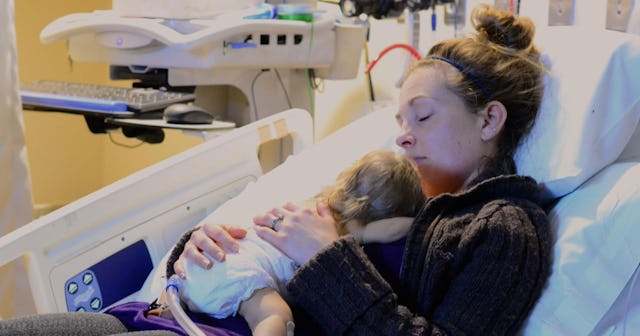I've Learned So Much Since Becoming A Bereaved Parent – Here Are The 10 Most Important Things

Trigger warning: child loss
Years have passed since I held my son Micah in my arms. Micah died from complications of necrotizing enterocolitis (NEC), a devastating intestinal disease, just before his first birthday. When Micah died in the Pediatric ICU, we left the hospital with his things in a plastic hospital bag and a 30-page booklet with “WHEN A BABY DIES” written on the cover.
I wanted to burn that booklet because the book itself felt traumatic, agonizing, and out of touch. One of the last things I wanted to do when Micah died was read a book about babies dying. Years later, I still have not opened it.
My grief journey has been full of growth and heartache. While it has not been easy, I have found peace. With the hope of helping other bereaved parents find a sense of peace, here are 10 things I wish someone would have told me when Micah died. With wishes of comfort to those seeking it.
You are always your child’s parent.
Empty arms and the passage of time cannot erase your child’s existence. Your child is forever a part of your life.
You are not alone.
Tragically, thousands of bereaved parents know your grief because they also lost a child to NEC. The child loss community can help you navigate the difficult days, months, and years ahead.
Do what feels right to you.
There is no “right way” to grieve. We all grieve in different ways. Give yourself permission to follow your own lead on this lifelong journey of grief. Your partner and your family may grieve in a way that is different from you. That is okay. The key is common grace and empathy.
Nature can be soothing.
Courtesy of Jennifer Canvasser
A walk in nature or time in the garden can have a calming effect. Spending time outside can help you process the trauma of child loss and clarify what you need to continue to move forward with your child in your heart.
There is no “moving on” from child loss.
The loss of your child is unfair and devastating. Time does not heal all wounds. This is not a loss to “get over.” A parent’s love for their child is enduring, even when they are not physically with us.
Grief, joy, and gratitude coexist.
Some of your feelings may seem at odds with one another, but they are not. After child loss, anger, regret, and despair often coexist with joy, thankfulness, and hope. Give yourself permission to experience and feel the full range of emotions so you can learn how to direct that energy in ways you find most helpful.
It is helpful to find ways to honor your child.
It can be small or elaborate, quiet or public, just as long as it feels right to you. Creating art or keeping a journal can be meaningful ways to honor your child. Honoring your child can help you find a sense of peace and meaning.
Some experiences will trigger strong emotions.
Courtesy of Jennifer Canvasser
In the coming weeks, months, and years, you will have certain experiences that remind you of your child. Raw emotions may come rushing back, and it can be overwhelming. It could be a song, a story, or even just a sound. You will learn to anticipate some triggers, but others will be sudden and unexpected. While these triggers may be painful and distressing, it is helpful to remember that they stem from the deep, everlasting love between you and your child.
Tell your loved ones how you want to be supported.
You can help them understand that nothing and no one can ever replace your child. You can let them know what is helpful and what is hurtful. Loved ones mean well, but they often need guidance on how to provide their comfort and support.
You will learn how to carry the crushing weight of your devastating loss.
You will learn how to carry your child in your heart instead of your arms. It will never be easy. Every day you will become stronger. You can lean into the community of families who have also lost their children.
The journey of finding peace after child loss is a difficult road and may take months or years. Each person’s road to peace will be different – even when mourning the same child. Once we have found peace, our hearts are still broken, and our lives are still changed. Life’s greatest blessings will never fill the void of our child’s passing. Ultimately, what matters is how we cope with and channel our grief. We can honor our child by living fully, nurturing one another, and giving back to others in our child’s name.
This article was originally published on